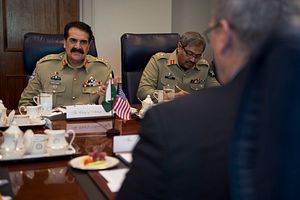Pakistan’s chief of army staff, General Raheel Sharif, will be spending the next five days in the United States. Sharif, who is not related to Pakistan’s prime minister, Nawaz Sharif, who also recently visited the United States, will meet with a range of senior U.S. officials. The general’s agenda will focus on a range of issues, but will almost certainly include a status report on the Pakistani military’s performance in Operation Zarb-e-Azb, Pakistan’s position on Afghanistan’s sputtering peace and reconciliation talks with the Taliban, and, perhaps the most furtive of all issues, the feasibility of a nuclear agreement with the U.S. government that would bring Pakistan into the fold as a “normal” nuclear-armed state. Sharif last visited the United States in November 2014.
Sharif is set to meet with a wide cast of U.S. officials. According to Voice of America, the general will meet with Secretary of State John Kerry, Secretary of Defense Ashton Carter, Vice President Joe Biden, CIA Director John Brennan, Army Chief of Staff General Mark Milley, and his effective counterpart in the U.S. military, General Joseph Dunford, the chairman of the joint chiefs of staff. Sharif and U.S. officials will run the gamut of the U.S.-Pakistan security relationship. The two countries are allies, but the relationship faces a number of pressure points. Specifically, the United States provides reimbursements to Pakistan from the Coalition Support Fund (CSF) for its efforts in fighting terror groups, including the Haqqani network. Earlier this year, reports emerged that the U.S. would suspend a CSR reimbursement tranche amid the U.S. defense department’s refusal to certify that Pakistan’s military was doing enough to fight the Haqqani network. In Washington, Sharif will be eager to repair perceptions and convince U.S. officials that Pakistan remains committed to fighting terrorists within its borders.
By all accounts, the issue of Afghanistan’s stalled peace talks will be a major point of focus for Sharif while he’s in Washington. After a brief spot of optimism this summer, when direct talks between the Afghan government and the Taliban took place in Islamabad with the support of the United States and China, peace and reconciliation talks have all but disintegrated. The Taliban has regrouped after its summer scramble following news that Mullah Omar, the group’s erstwhile leader, had been dead for over two years. Taliban militants have even exhibited major battlefield successes, such as their recent siege of Kunduz, which saw Afghanistan’s fifth-largest city fall–a first for a city of that magnitude since the U.S. invasion in 2001.
With the stakes higher than ever for the Obama administration in Afghanistan, U.S. officials will be keen to convince General Sharif that Pakistan’s interests will be best served by reigning in militants who stage attacks on Afghan soil from the Pakistani side of the porous border. Additionally, the United States will seek assurances that the Pakistani military can bring the Taliban back to the negotiating table. The Taliban’s leadership shake-up temporarily raised concerns that Pakistan’s military had lost its grip on the group, but this appears unlikely. Matters are somewhat alleviated by the fact that China–another important ally for Pakistan–is keen to see a return to sustainable peace talks as well.
Finally, though we may not see many details in out in the open following the general’s time in Washington, Sharif and senior U.S. officials will go over the feasibility of the much-discussed “nuclear deal” for Pakistan. According to outlines of the deal reported by the New York Times and the Washington Post, the broad-stroke quid pro quo on offer from Washington is that Pakistan reign in and cap its nuclear arsenal (including all development of low-yield, short-range tactical nuclear weapons) in exchange for U.S.-backed entry into the global community of normal nuclear states. Pakistan’s government being what it is, a decision of this magnitude on the country’s nuclear weapons program cannot be made without the full backing and blessing of the country’s military. The Pakistani military certainly has good reasons to see little use in such a deal and Washington may be mistrustful of Pakistan’s intent to comply, but these are issues that will certainly be on the agenda during Sharif’s time in the United States this week.
General Sharif, increasingly lionized as a “soldier-statesman” back home, will be looking to deliver good news on his return from Washington. In Pakistan’s democracy, the primacy of the civilian government has never held for long and, when it has, it has usually represented something of a facade. Nawaz Sharif, the prime minister, is increasingly being seen as the steward of a weak and limping Pakistani government. General Sharif, in the meantime, has risen to cult hero status in Pakistan. Historically in Pakistan, the chief of army staff has exercised veto power on major decisions in the country’s foreign and security policy, and this is the case today between the two Sharifs.

































